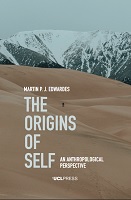The Origins of Self
An Anthropological Perspective
Abstract
The Origins of Self explores the role that selfhood plays in defining human society, and each human individual in that society. It considers the genetic and cultural origins of self, the role that self plays in socialisation and language, and the types of self we generate in our individual journeys to and through adulthood.
Edwardes argues that other awareness is a relatively early evolutionary development, present throughout the primate clade and perhaps beyond, but self-awareness is a product of the sharing of social models, something only humans appear to do. The self of which we are aware is not something innate within us, it is a model of our self produced as a response to the models of us offered to us by other people. Edwardes proposes that human construction of selfhood involves seven different types of self. All but one of them are internally generated models, and the only non-model, the actual self, is completely hidden from conscious awareness. We rely on others to tell us about our self, and even to let us know we are a self.
Keywords
Self; Selfhood; Anthropology; Psychology; Linguistics; Evolution; anthropology; philosophyDOI
10.14324/111.9781787356306ISBN
9781787356320, 9781787356313, 9781787356337, 9781787356344, 9781787356351, 9781787356306OCN
1126206009Publisher
UCL PressPublisher website
https://www.uclpress.co.uk/Publication date and place
London, 2019Classification
Philosophy of language
Psycholinguistics and cognitive linguistics
Sociology and anthropology
Cognition and cognitive psychology
Psychology: the self, ego, identity, personality
Life sciences: general issues


 Download
Download Web Shop
Web Shop